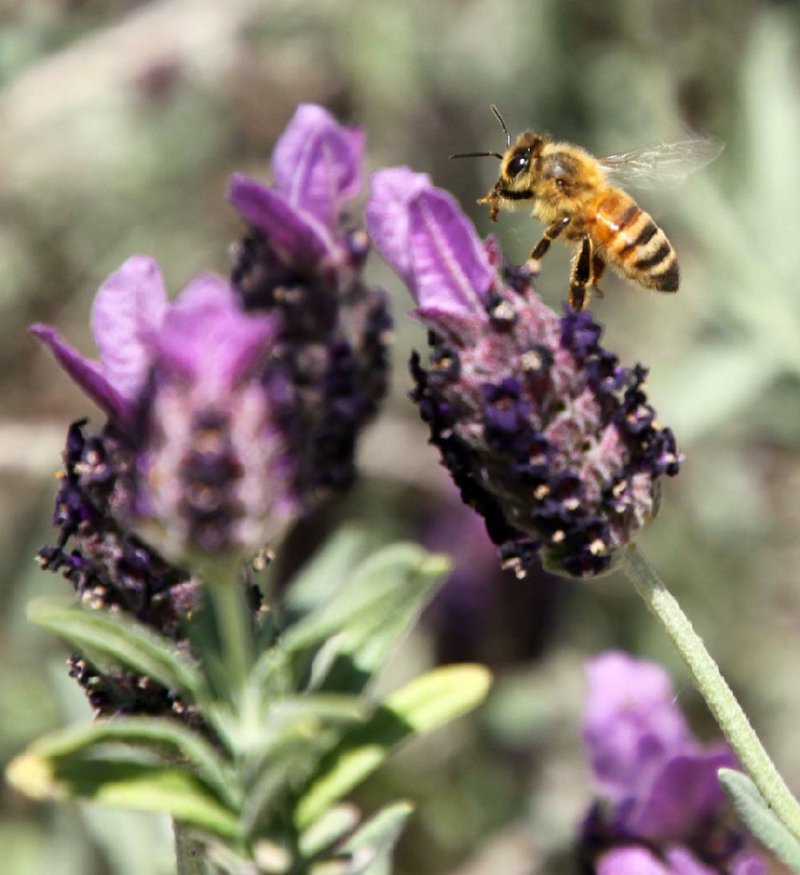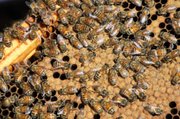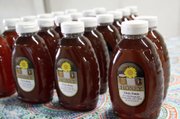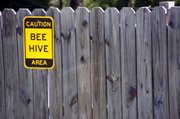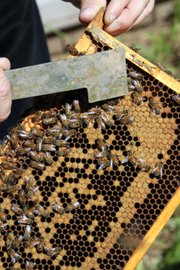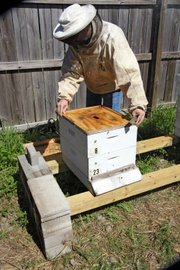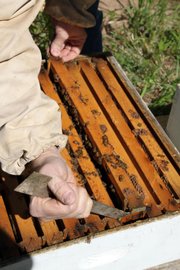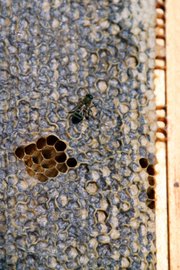RISON -- Elvin Bates has 90 years' experience with bees, and people are eager to hear him talk about keeping the insects vital to agriculture both big and, in this case, small.
Small as in backyard gardening, improved and supplemented by backyard beekeeping.
"He has so much knowledge, it's hard to soak it all in," Lindsay Henry of Star City said. She's a gardener, needs bees, and will soon get her first hive.
Bates, 98, was a big attraction earlier this month at the fourth annual Arkansas Homesteading Conference.
It helps that he's a hoot.
"I'm pretty active," Bates said. "I have a full head of hair and some of my natural teeth. I don't take any medications. I eat, sleep and work."
Work includes caring for about 100 hives on his 250 acres of land near Monticello, and extracting and bottling the honey. Each hive produces 40-45 pounds of honey a year, Bates said, which is sold around town with what he calls "a little mark-up."
He also has a big vegetable garden, Bates said.
"I never did a day's work in my life, but I work all the time."
Bates is said to be the oldest living World War II veteran in Drew County. He came ashore on D-Day, at Utah Beach, and made it all the way to Berlin.
When he was 8, growing up in Snyder, in Ashley County, his mother asked him if he could rob a natural bee hive. The family needed the honey to sell. "Barefoot and bareheaded," he did it. Thus was born a lifelong avocation, pursued in earnest after the war.
Bates' presentation to the conference featured a conversation and Q&A with Lori Bird, who with her husband, Trent, operates Birds
& Bees Honey of Rison.
"He is constantly finding new and better ways to keep bees," Trent Bird said. "We welcome any kind of advice he can give us."
Much of the advice Bates dispensed was common sense.
Bees need good clean water. Provide them with a source such as a bird bath.
Pesticides and insecticides are harmful to bees.
Pine works for building hives, and lasts about five years, but cypress is better. People ask him how long cypress lasts. "I don't know yet."
Learn by doing. "I learned by fooling with it myself. I didn't have a beekeeper to teach me."
To find bees in the wild, follow the scouts. "They're searching out a new home."
Some folks wear a bee suit; some don't. Bates doesn't. "You get stung some, but that's part of it." He did recall years back when he was thoroughly stung and his face swelled up. His wife looked at him, Bates said, and told him: "You're not as smart at I thought you was."
Bees are seldom a bother, Bates said. A neighbor once complained to Bates because bees were drinking from her pool. "Can you identify these bees as mine?" Bates asked the neighbor. "Because I can't."
Trent Bird credits Bates' advice with helping his own operation grow from 25 to 200 hives from which he extracts honey sold from south Arkansas to Little Rock. He has known Bates for about 10 years, having met him at Bates' cypress mill in Drew County.
"Elvin has the knack of knowing what a young beekeeper needs to know to maintain 200 hives," Bird said.
"He's continually figuring out ways to improve things. He calls me once a month with a new idea, and I've never asked him a question that within a day he couldn't answer."
People who want to keep a hive or two in their backyard should become educated, Bird said, and when ready should get bees that are virus-resistant. As for neighbors, "they'll never know."
"We need a lot more backyard beekeepers," Bird said. "Because feral bees are becoming really rare."
...
Jon Zawislak would second the motion for backyard beekeepers to get educated. He's an entomologist for the University of Arkansas Division of Agriculture's research and extension service. In other words, he's the bee guy.
Being the bee guy means having a bee research station. Zawislak's is at Two Rivers Park, in a big meadow near where gardeners rent plots. The spot is ideal. The meadow provides habitat and flowers for the bees. And the gardeners benefit from the pollination. Gardeners get bigger flowers, he said, and more produce.
The eight hives are situated near a tree line and behind a tall three-sided wooden fence with signs: "Caution. Bee Hive Area." The height of the fence forces the bees to fly up as they leave the hives.
Not that bees should be feared, Zawislak said. They're actually quite gentle when left alone.
"When we see them outside flying around, they have one thing on their mind -- getting food for their family. They're not interested in us at all."
Except when they perceive people as a threat. A visitor was stung twice, on the head and the right eyelid. Live and learn -- stay out of the flight path, meaning don't stand in front of a hive. And bees associate dark clothing with threatening animals. To a bee, a human in dark jeans and a black shirt looks like a bear, "or a very large badger."
Zawislak said the stings were a freak accident. "People rarely get stung out here."
He encourages beginning beekeepers to read up on the topic and take a beekeeping class. He teaches several a year, in three sessions, with a class in Little Rock on May 10, 17 and 24, at the Hillary Rodham Clinton Children's Library and Learning Center.
"Having it all presented in order makes a lot more sense. And it's good to have a reference book."
Attendance at his sessions runs from a handful to 300 people, he said, with big classes in particular in Northwest Arkansas.
Beekeeping costs run from $500 to $700, Zawislak said. Better to get two hives, so that if one isn't doing well the beekeeper can figure out the problem and correct it. The cost is mostly up front, because hives last many years. Expenses would include gloves and a bee suit that covers the face and upper body. "If you keep bees you're going to get stung."
Beekeeping is a hobby that can pay for itself, he said. "People who have honey never have a shortage of customers."
Keeping bees can be a challenge, he said, because they have a lot of health issues including the varroa mite, which is responsible for the disappearance of wild bee populations. Wild bees also suffer from the loss of habitat, including meadows and wildflowers.
Each hive has a queen, and the population runs from 20,000 to 50,000 bees depending on the season, with lower numbers in winter and peaking in June. If bees get too crowded, they'll swarm.
A swarm is "a big bunch of homeless bees. They're the most gentle you'll ever find them because they don't have a home to protect."
Honey from the Two Rivers hives is collected and donated. At this year's garden show honey was put into about 1,000 small bottles to be given away. Some honey is given to "commodity groups that fund some of our research," Zawislak said.
Zawislak has his own backyard hives. He compares the taste of home-grown honey versus store-bought honey to the difference in home-grown versus store-bought tomatoes. So much better, he said.
Neither do beekeepers ever lack a market.
"You can grow zucchini and run out of people to give it to," Zawislak said, "but that never happens with honey.
"People are always happy to have honey."
HomeStyle on 04/22/2017

